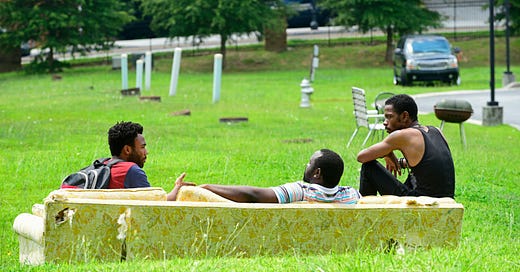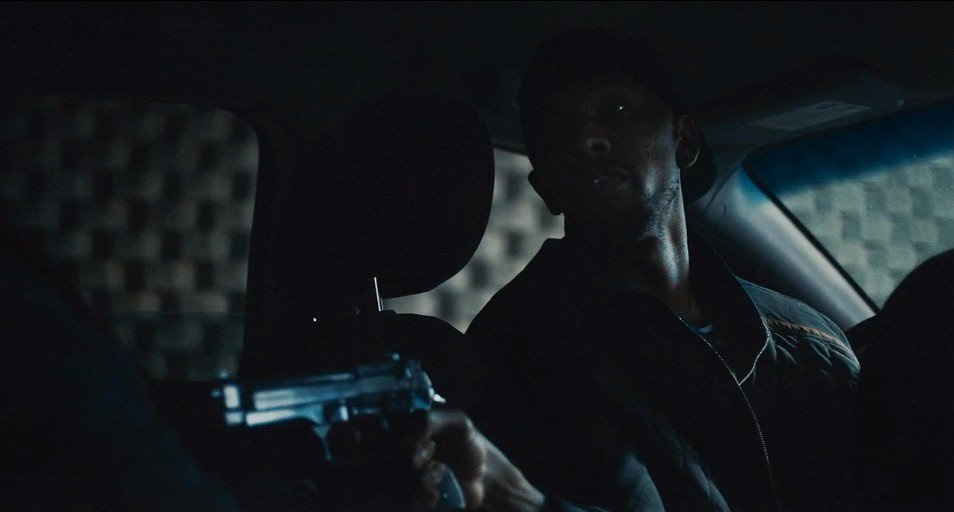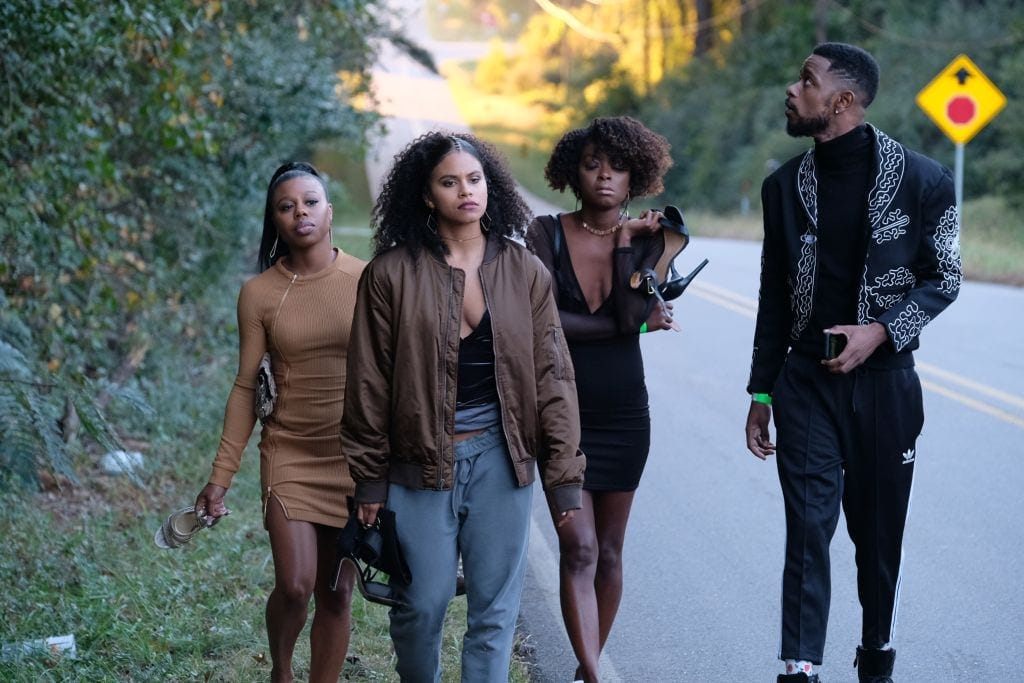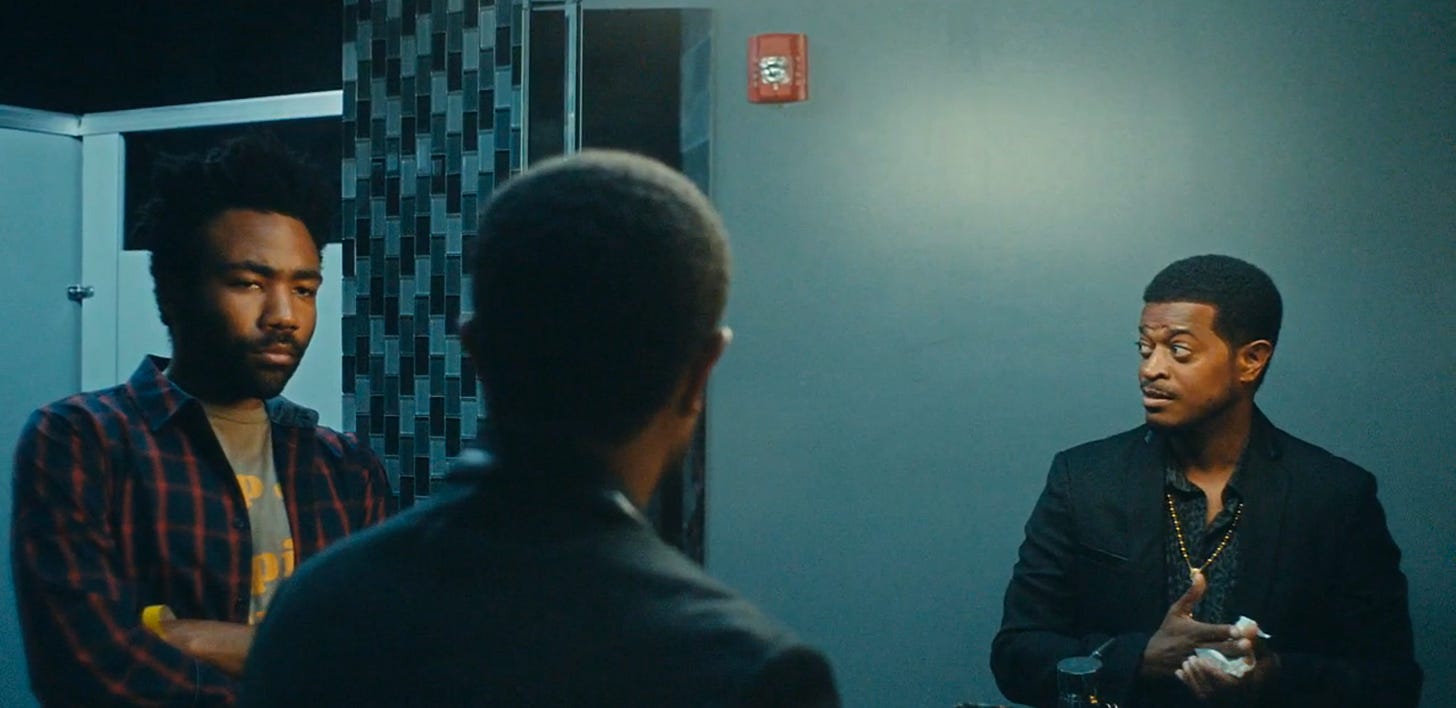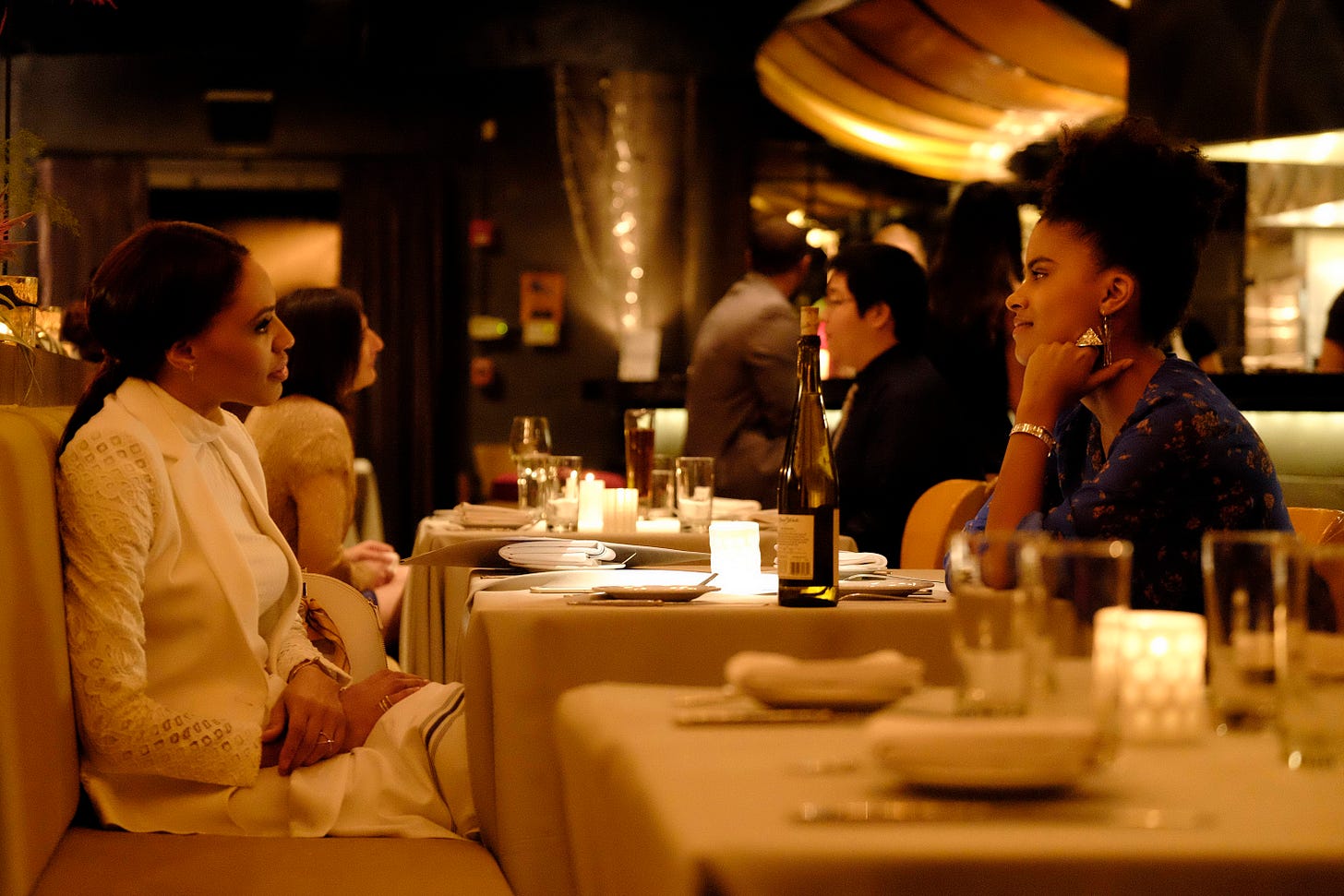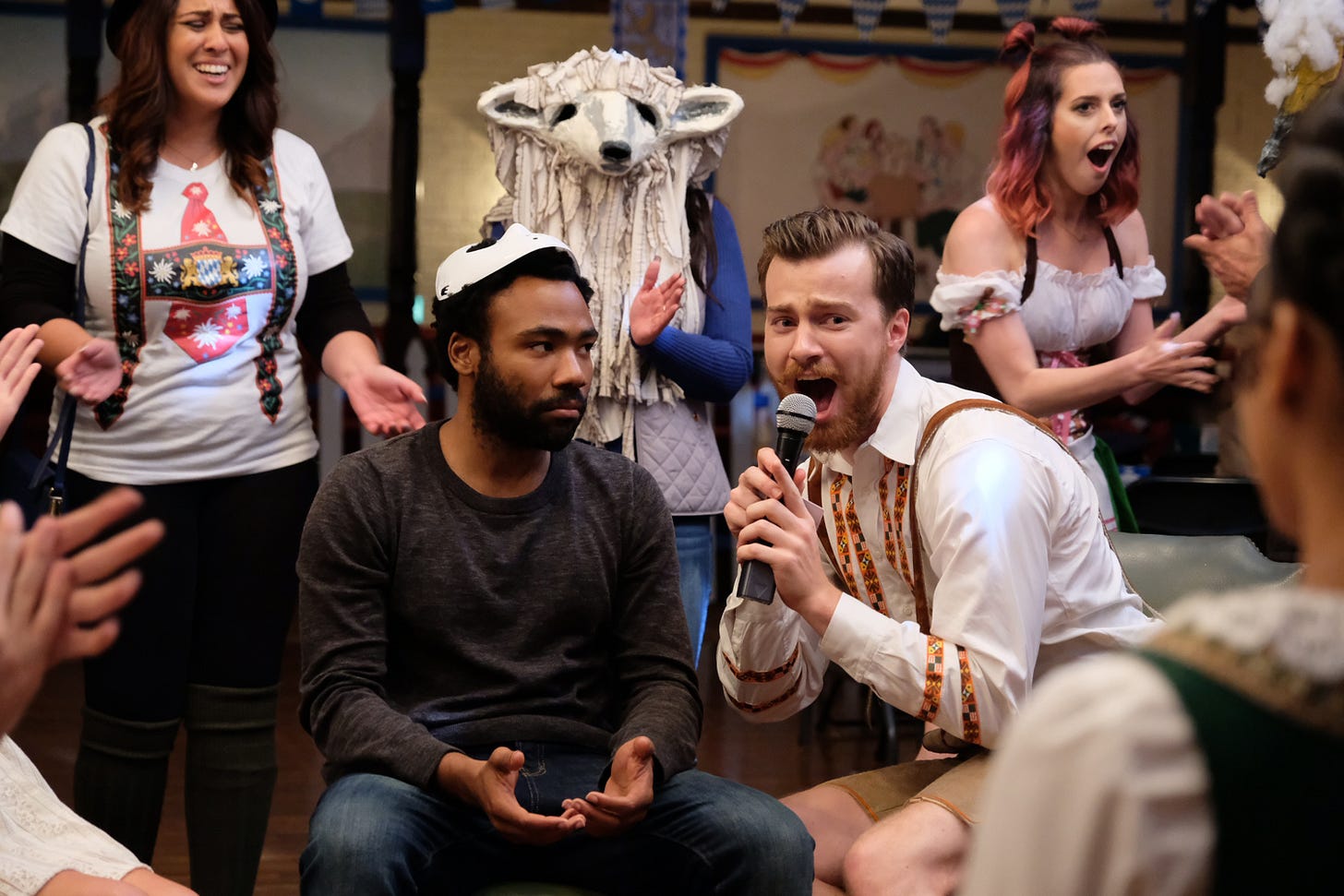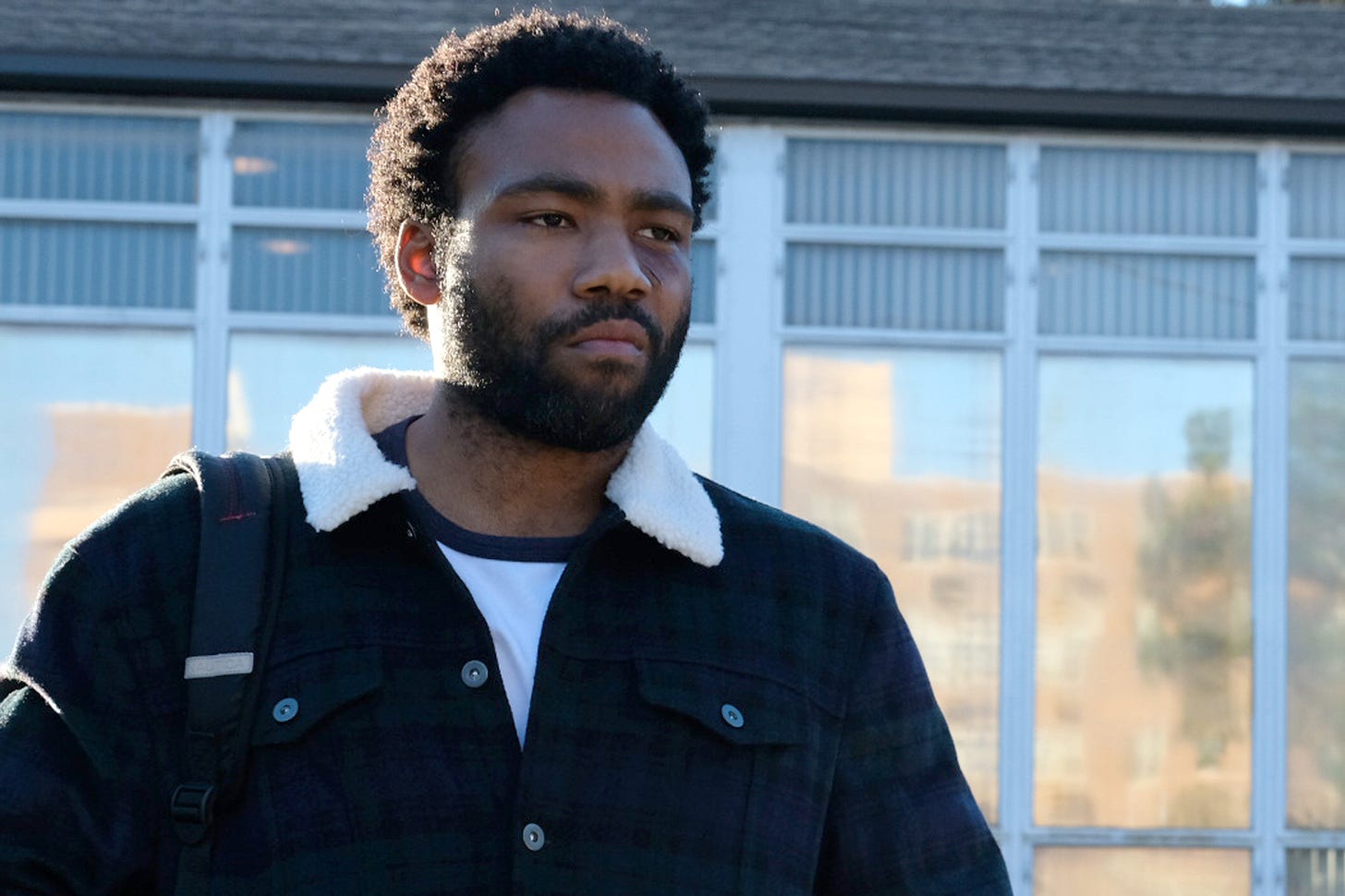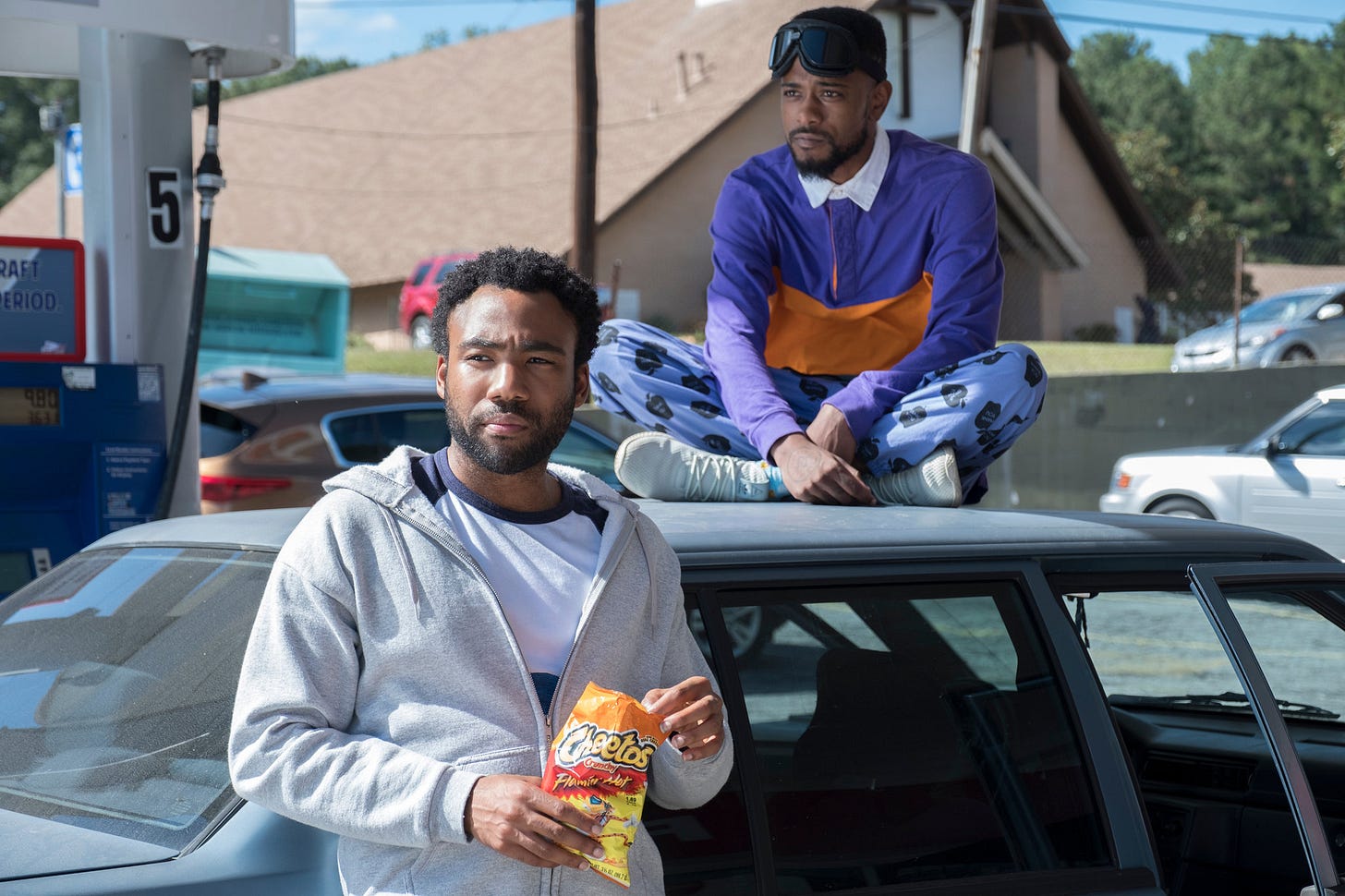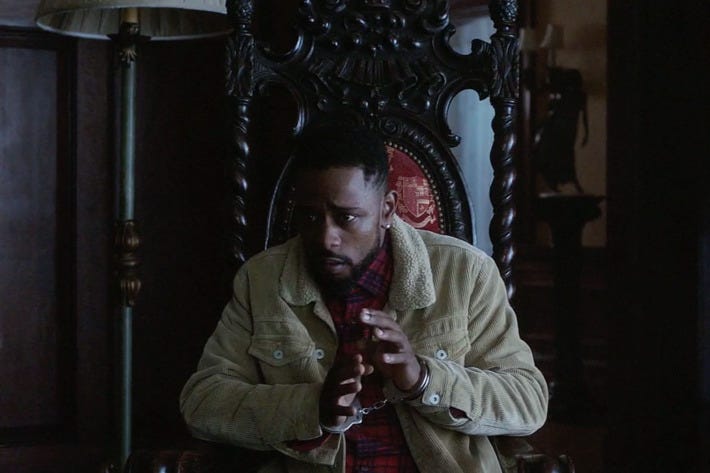Every episode of Atlanta's first two seasons, ranked
Ambition is a funny thing. Everyone, to a degree, has it, but it takes drive to act on it. It takes effort. And effort? Bleh. Who wants that? Who wants to finish their article series? That’s for losers. In an industry full of products that feel like they’re losing their way or never really had a way from the start, ambition is what I’m seeing a frightening lack of. Sure, you’ve got the underfunded geniuses like Steven Conrad or Dennis Kelly or Matt Johnson (Please, for the love of god, let Nirvanna the Band the Show come back. I will give Canada my firstborn, just bring it back.) trying to keep it alive, and we even have a few shows in the mainstream (Better Call Saul, Succession, Ozark, etc.) that are pushing boundaries and doing something interesting with their craft, but I have to face the facts—television is dying and being supplanted by the internet. This scares me a little. This is my favorite medium, and while I’m sure I’ll have the hundred hours of Mad Men and sixty hours of The Wire to keep me busy long after TV is officially dead, I can’t help but feel worried and more than a little sad as I see the way general viewership for shows is declining.
But thanks to rapper, singer, actor, writer, and now director Donald Glover, I can distract myself from television’s demise for ten and a half (fifteen and a half in a week!) glorious hours. Atlanta is a show that constantly strives to one-up itself in scale and filmmaking prowess (and Glover himself said seasons three and four of the show were going to be some of the best TV ever made) and almost never disappoints—so I want to talk about the first two seasons before the third season drops very, very soon and the fourth and final drops later this year.
Oh, and spoilers abound, obviously. Mostly minor, but if you want to go in one hundred percent blind, this isn’t for you.
21. “Nobody Beats the Biebs” (Season 1, Episode 5)
Glover has said that the seasons of Atlanta are meant to parallel the chronology of Kanye West’s studio albums—season one is The College Dropout, Robbin’ Season is Late Registration, and so on. Considering that his musical alter ego took heavy inspiration from Kanye, (at least on Camp and parts of Because the Internet) this checks out to me, and the writing of Atlanta’s first season reflects the haphazardly cheeky writing of TCD, as though 27-year old Kanye and 33-year old Glover are winking at each other from across time and space as if to ask “can you believe what they’re about to experience?”
“Nobody Beats the Biebs”, however, is more like someone took all the skits from Kanye’s first two records (back when he did those instead of the two hour, two hundred dollar albums he does now for some reason) and meshed them together—on their own, they’re funny and brisk—but together, they become multiple ideas that don’t flow well, if at all. This is an episode that makes one big mistake: it separates the cast that, for four episodes, have had at least one story together that allows them to play off each other marvelously. Al is stuck playing basketball with Justin Bieber, (who, in what is admittedly an awesome joke, is played by a black man) Darius is chilling at the gun range, and Earn is doing…something? He’s at, like, a networking event in the stadium? Or something?
That’s not to say the disjointed nature of this episode prevents it from being very, very funny, (Al screaming “I hate you!” at Bieber while fighting him will never not be funny to me) and two thirds of it is pretty damn solid, but ultimately, I could get the same experience watching three of those weird little short films Glover likes to make on YouTube. If nothing else, “Nobody Beats the Biebs” reminds its audience of his musical prowess—because, disturbingly enough, the fake, intentionally shitty Justin Bieber song he made for this is actually kind of great.
20. “Sportin’ Waves” (Season 2, Episode 2)
Robbin’ Season is very different from its predecessor. I compared “Biebs” to Glover’s comedic short films, but honestly, the majority of season one kind of reminds me of them in terms of tone. Robbin’ Season is darker, more focused, less about multiple characters at once and more about one or two per episode.
“Sportin’ Waves” is sort of season one being expunged from Atlanta’s structure following the tremendous “Alligator Man”, a fun and loose story about Earn having to spend time with Tracy, Al’s obnoxious ex-con buddy, while Al and Darius find a new weed plug. (His old one robbed him in what is probably the episode’s best scene.) There are a lot of ridiculous and silly scenes that make for some good comedy—the aforementioned opening scene, the weird first attempt to find a dealer, the shoe store with the “no-chase policy”—but it never feels like it coalesces into something larger or more interesting. Which is a shame, because that first scene really was fantastic. Perhaps the fact that I have so little to say about this is a commentary on something—actually, maybe I’m just struggling to extend this section. Is it that? It’s probably that.
19. “The Big Bang” (Season 1, Episode 1)
Recently, I took a class on television pilots that I found pretty interesting. From what I’ve inferred, the job of a pilot is to introduce the characters above all else—who they are, how they exist alongside each other, you get it. “The Big Bang” is not a fantastic episode of television or anything like that, but it is a fantastic pilot, the opening scene alone perfectly introducing three of the four characters effortlessly, and with flair and a decent introduction to the fourth to boot.
This isn’t an episode that’s striving to do a lot like, well, every other episode of season one, but it’s not one that necessarily needs to beyond introducing its audience to the world the characters live in. The “manager Earn” plotline has always been the least interesting facet of both his character and the show’s stories, and it’s not exactly riveting here, but it does a decent enough job getting us inside the mind of Earn and his ability to think on his feet—except in the instances that really matter, like stopping his relative/new client from shooting a guy, for instance.
It almost feels like a prototype for the structure of a Robbin’ Season story, one that primarily focuses on Earn, albeit with a more of a “point A to point B” focus than a dour character study. It’s consistently funny, it’s really weird, and by the end of it, I have a grasp on all four central characters pretty firmly—so in other words, it’s a pretty great pilot episode of television.
18. “Champagne Papi” (Season 2, Episode 7)
Perhaps the most prominent thought I was thinking throughout the entirety of “Champagne Papi” was something along the lines of “Van needs better taste in people.”
Am I wrong here? I thought things were going to be a little different for her after the events of a far superior episode that we’ll get to later, but even if she no longer has to put up with Earn’s very handsome whining and bitching, she’s still stuck at this shitty New Year’s party with two shitty friends and one nice one that’s too busy tripping the hell out to enjoy herself. Worst of all, this party is hosted by Drake. Well, on the bright side, Van is good with kids. (Eh? Eh? Can you see me raising my eyebrows and smirking at the camera?)
It’s interesting to see Robbin’ Season have an episode that contemplates an aspect of culture at large, not just a minor idea that is secondary to the character analysis at hand. It almost feels like season one, but still retains that foreboding tone that season two has perfected, with scenes of Van getting led into the more secluded parts of the off-putting mansion by a strange guest providing the episode with genuine tension and anxiety. “Champagne Papi” is less about Van than it is about the “realness” of celebrity culture and people in general, a theme that repeats itself often throughout Atlanta’s sophomore season, but it feels more hyperfocused here, which hurts it in the long run. Unlike “Sportin’ Waves”, this episode absolutely feels like it has an overall purpose, idea, and ending, but it still ends up, at parts, feeling as real as a cardboard cutout of Drake—with less alleged condom hot sauce, at least.
17. “Streets on Lock” (Season 1, Episode 2)
Where “The Big Bang” felt a little wander-and-wonder, the second episode of Atlanta feels like a mixture of that and a tight narrative about the all-knowing “system” that is just there to waste people’s time, as well as the effects crime can have on rap—namely, the positive ones.
Despite the fact that Earn gets more screen time in this episode, this is definitely one about Al and how he may be cut out to be the tough guy top dog in Glover’s world, but he clearly doesn’t want to be. He drifts around like the Ghost of Lemon Pepper Joints, receiving rewards—publicity, attention, good food—for his act of violence, despite his feeble attempt to tell the kids “playing Paper Boi” that “shooting people, that isn’t cool.” He can be the hardass, as he is told he needs to be in “Biebs”, but he just doesn’t want to be, and that makes him much more interesting than his occupation of “angry rapper” would suggest.
Earn, meanwhile, is stuck in the aforementioned system, where Glover’s love of skits becomes more apparent—crazy characters rotate in and out as though they’re being shuttled through the very system that is confining them. Every single one of them lands (my favorite is the guy complaining about the old acquaintance who got him locked up, only for that acquaintance to be revealed to be sitting in front of him the whole time) and Atlanta, with “Streets on Lock”, gets to prove itself as a comedy above all else, a very funny one at that.
16. “The Club” (Season 1, Episode 8)
Can I just say how stupidly happy Earn shouting in the nightclub owner’s ear because loud music is playing makes me? I think people are learning about that, but not enough people are doing it. I know it’s a small thing, but it’s the little things that make me look back and smile when I see them.
Anyway, this episode is great, right? This is a half hour that places the central characters in a very strange, abstract environment and lets them do their thing, and the result is pretty damn entertaining. The best story is with Earn, who is sent to collect for Al after he graces the club with his presence, (even though Al is just sitting there and whining) but finds that the owner is ridiculously elusive. Al, meanwhile, is stuck trying to prove that he’s the coolest person in the club, but is outclassed by some big-shot NBA player who everyone can’t resist flocking to.
This one is uproariously funny. Nearly every weird, off-color joke lands, from the guy who walks up to Al and starts reciting his lyrics in the most deadpan way possible, to Darius getting free drinks everywhere because he’s “the guy,” to, you know, the invisible car. Beyond the writing, the directing in this episode is fantastic, longtime Glover collaborator and series staple Hiro Murai creating an environment that is both endless and nerve-wrackingly claustrophobic, with everyone not central to the scene still feeling like real people instead of just background props to add to the illusion of a club. It’s almost like a showcase of how good Atlanta can be, craft-wise, when it really wants to be, (not to imply that it usually isn’t) and it’s still insanely funny and so easily rewatchable.
15. “Go for Broke” (Season 1, Episode 3)
This is the funniest episode of season one. That may be a strange statement to make—after all, this isn’t even in the top half of the season’s ranking—but something about the comedy in “Go for Broke” just works for me on every level. Despite the fact that this is one of the darker episodes of the season, (it’s one of the only two where we definitely see someone die) it’s just funny as hell, the filmmaking in said darker scenes even playing into the comedy a little. There’s a creepy, overly dark scene where Al and Darius are led out into the woods to make a drug deal, and the self-seriousness when the punchline is revealed as the dealers being Migos feels like a joke in and of itself.
In fact, if I were to praise “Go for Broke” for one thing above everything else, (aside from, of course, the comedy) it would be how well it balances the two duos the episode sets up pretty flawlessly, because yes, this is one of those rare Atlanta ventures where all four major characters are prominently featured. Al and Darius are, as I mentioned, out in the woods with Migos, while Earn is faced with the challenge of taking Van out for a nice evening on a budget of under seventy dollars. All four actors do fantastic work here, as the audience watches poor Earn slip further into insanity as the restaurant keeps trying to upsell him, Al and Darius bounce off each other excellently while they try to, as quietly as possible, get the briefcase they brought to the deal off of Darius’ wrist, (he handcuffed it there for “professionalism” reasons) and Van’s easy and annoyed deconstruction of Earn’s little speech at the end just kind of caps it perfectly.
“Go for Broke” is not the most profound, complex, or detailed episode of the first season. There’s not a ton of deep commentary or satire present, nor is there insane filmmaking at play here. It’s just really, really funny—and sometimes, that’s all a great episode of Atlanta needs to be.
14. “Value” (Season 1, Episode 6)
Before “Value”, three of the four characters of Atlanta had had a great amount of time in the spotlight, time for the audience to connect to and understand them. Earn was, of course, the main character, (no matter what my father says) so he got the most screen time and little character moments. Al is what Earn’s theoretical success hinges on, so of course he also got a significant amount of time devoted to him. Darius was the comedic relief character, one that (at the time) couldn’t function properly without good buddy Al or hapless Earn by his side, if “Biebs” proved anything, so he was always there to crack another joke and further entrance the audience. That just left Van, who was just…Earn’s kind-of girlfriend. She had one really great episode (“Go for Broke”) and some funny moments in the other stories she was featured in, but that was about it.
“Value” makes up for this lack of balance by making the entire episode Zazie Beetz’s show, one that pits Van against more crappy friends and has her show the audience her quick thinking and cunning that trumps her lesser half quite easily. The first half is almost deceptively calm, where Van has dinner with a friend of hers that ends with her storming out and being coerced into smoking. Of course, this ends up having consequences—she has her drug test the next day at her teaching job.
I mentioned that Van had the excellent “Go for Broke” as an episode that prominently features her, and I think that’s funny. “Broke” was a trial for Earn all about keeping Van happy on their date without going overboard, but “Value” is about trials of her own, and while it has its funny moments, it feels surprisingly dire. Now that Van has some characterization, it’s easy to feel worried for her and want her to succeed. It impressively balances its laid-back, conversational first half with its more urgent second, creating a sense of (pardon my oxymoron) calm panic—almost like you’re the one that’s high.
13. “The Jacket” (Season 1, Episode 10)
First-time season finales are weird. Reviewers like to talk about the “sophomore slump” that bogs down shows that get lucky enough to go beyond one part of their story, and I think part of this recurring issue is that season one finales set an expectation as to what its successor is going to be like. Think, say, Stranger Things, a show that used to be about a kid who went missing and another kid that didn’t, and now it’s about…Russians and fakeout deaths and introducing five new characters a season and doing nothing with them, because that’s what the Duffer brothers think qualifies as good writing, I guess. In contrast to “The Big Bang”, “The Jacket” needed to bring the ideas of season one to a close, while setting the tone of a new season in motion.
“The Jacket” does all of this, and maybe just a little more. After coming off of the high of something we’ll talk about several entries from now, this episode has a surprisingly simple and straightforward plot—so straightforward, in fact, that it wraps up before it even begins to finish. It almost seems like a sitcom plot: Earn loses his jacket, he’s insanely hung over, and so he needs to use Al’s social media documentation of their night of partying to get it back. A good fifteen minutes are spent on locating and retrieving this thing, (ending with one of the most finely directed shots the show has yet to pull off) and the last ten serve as an epilogue to the events that have just transpired.
This seems like a strange way to structure an episode. Hell, the first time I watched it, that was my biggest criticism. I felt as though it was unbefitting of what my conception of season finales were at the time of watching—but sixteen is a foolish age, and now, I understand that the last ten minutes of “The Jacket” is an epilogue, not a complete story. I’ll try to keep things minimal regarding it so as to let the audience think about it, as that’s how I found myself enjoying it the most, but the epilogue ties together not just “The Jacket”, helping us understand why everything happened, while also putting the entire season under a microscope and understanding why it just is to begin with. There’s a lot going on here that I don’t want to go too far into because I feel as though this kind of article isn’t the right format, but I think it’s important that I call back to my comparison of a sitcom earlier to highlight a theme—like the jacket and the episode’s final location, it’s what’s on the inside that counts.
12. “Helen” (Season 2, Episode 4)
God, I love Van episodes so much.
“Helen” is not, as my one-liner opening paragraph would suggest, one hundred percent a Van episode, but a significant portion of it definitely is. If I had to draw a little diagram, I’d say it’s thirty percent Van, ten percent Earn, and the rest is Van and Earn. A trip away from The City in a Forest (out into an actual setting in a forest) is all the sort-of couple needs for their relationship to crumble, and crumble it does. This episode is just…fucking sad, man. It’s funny, but it’s really, really sad, and it’s the first entry of Robbin’ Season, and really the series, to be dour to such a degree.
This is also the first episode of Robbin’ Season that has a more horror-y tone to it, with the feature attraction being a tall, giggling demon known in German as the Schnappviecher (a word that is as infuriating to write as it probably was to create) that separately haunts Van and Earn at different points. In fact, they’re being haunted throughout the entirety of their time in Helen, both in ways mental and physical—Earn, by his fear of commitment, and Van, by her own regrets about her relationship with Earn. If anything, it’s another “trials of Van” episode, one that forces her to question whether or not it’s worth it to continue with him when he’s happy with their status as friends with benefits who also have a daughter.
Similar to the horror elements, “Helen” is the first episode of Robbin’ Season to prominently feature the idea of “real” as a central theme—as though Earn and Van leave Atlanta, only to come back different people and make it a different place. In fact, that’s what it feels like “Helen” is as a whole—despite the fact that two of the three episodes that come before it are significantly better than it, (and all of the episodes that come after it, bar one) it’s about going from season one to season two of Atlanta, signified with an ending so heavy and almost uncharacteristically miserable that it really solidifies this idea.
11. “The Streisand Effect” (Season 1, Episode 4)
Glover’s musical peak (so far) is on 2013’s Because the Internet, an album that is by no means perfect, but one I hold dear to my heart and love over half the tracks off of it like my own audial children. Because the Internet is an album that follows a narrative, one about a character that gets his jollies by messing with people online and has rich benefactors to back up his hedonistic lifestyle, and, naturally, is unhappy. It’s not a particularly complex idea to do an album about, but it is a very nice-sounding one.
“The Streisand Effect”, or at least half of it, feels like it’s about this theoretical troll, but instead of making him out to be the detached (and slightly repetitive) protagonist of BtI, it turns him into an obnoxious, larger-than-life pest who scooters around on a hoverboard and makes lazily constructed vines mocking Al’s music and image. Professional troll Zan’s actor plays him with considerable gusto, his dedication to befriending and then pissing Al off admirable with how damn persistent it is, but things become even more interesting when Al goes to confront him directly and learns that he’s just…some guy.
That story is certainly an excellent part of the episode, but the best part is undoubtedly Earn and Darius, the latter of whom takes the former to go make some money in a roundabout, complicated way that takes them through a few fun set pieces. (My favorite is the fence Earn leans on while waiting for Darius, where goats mill around behind him and a Chinese man frantically sobs into his phone nearby. This show has a penchant for creating visuals that don’t feel certain as to whether you should feel anything looking at, and it’s great at it.) This is, for one, a great Darius episode, (“Chinese people are short ‘cause of Genghis Khan. Look it up.” “In what? The racism book?”) but it’s also a great excuse for the stuffiest character and the most lax to spend some time together and form some kind of friendship.
Atlanta’s first 10/10 is also its least effective, which obviously doesn’t diminish how damn good it is, but it’s there. It’s funny, it’s got fantastic use of music, (that shot of the gun on the table with “Space Song” playing has stuck with me) and it just feels like a complete experience, a lack of one being something that I felt hurt “Streets on Lock” and “Go for Broke” before it. This isn’t an episode about “don’t feed the trolls” or how “people really like dogs,” as Earn puts it when the money from the dog finally gets paid off in “Sportin’ Waves”—this is an episode about how everyone is human to a fault—and whether that’s a good or bad thing is up to you.
10. “B.A.N.” (Season 1, Episode 7)
Here’s something you may not expect—this episode was polarizing with critics. It sports a proud 9.3 on IMDb and stands as the second highest rated of the series, and I’m sure the majority of you reading this think of this as one of Atlanta’s best. And for good reason! Now, I know, I know, most online journalists are hacks, [PLEASE CLICK THIS LINK TO READ ABOUT THIS ARTICLE’S SPONSOR] but we’re not talking about game journalists here. We’re talking about people who have brains, and some of these people think this episode is overstuffed and disjointed. And I understand that! Clip shows are never going to be universally beloved (because they suck most of the time) even if the occasional genius can put their own creative spin on it, so I’m not uncomfortable saying that “B.A.N.” is certainly not for everyone.
That being said, I absolutely love this episode and think it earns its spot in (as of now) this show’s top ten. “B.A.N.” takes place on Montague, a fictional show on the fictional (and titular) Black American Network, which Al is starring as a guest on because of some Twitter comments regarding Caitlyn Jenner and is debating Debra Holt, a white woman who is regarded as an expert on the subject of transgenderism. Littered throughout are little skits cleverly disguised as commercials for products both real and fictional.
Now, this is an ambitious idea for any episode of television on multiple levels. The filmmaking needs to be varied and well-planned to make each segment convincing, and the writing needs to match it. It’s one thing to create the concept for “B.A.N.”, but it’s another to do it—and yet Glover, who became the first black man to win an Emmy for television directing because of this—does it. And he does it with gusto. The main Montague set is perfectly flat and has five or six shot types total. The live-action commercials are smooth and overexposed, the TV documentary opens with a pan down to the host that is so indescribably realistic that you have to see it to believe it, and even the animated cereal commercial nails the music. Small criticism? There’s a segment or two where I feel like I’m either missing the joke or it’s not landing, namely the malt liquor and cigarillos commercials, (I only recently understood the iced tea one and it’s very funny to me now) but they’re so well made and take up barely any time that I can’t bring myself to fault the episode for it.
But most of the criticisms I see levied at this comes from the main storyline, where Al is stuck arguing with Holt and Montague, mostly over the idea that what’s trying to be said feels confusingly communicated and unclear. This is also a criticism I understand, but here’s the secret that both solves it and makes it so complex: the meat of this episode is three people talking about subjects that, as a whole, they don’t understand at all. Al doesn’t grasp the nuances (or, really, some of the basic ideas) of the trans community, while Holt clearly does not have a handle on the culture of rap, and Montague reveals his more nefarious side when he tries to piss his guests off and bait them into a disagreement after they actually manage to come to an almost peaceful resolution. At first, I was worried the “transracial” guest (played by the disappearing guy—you know the one) and the way he was presented was going to be an easy “well, if you’re not cool with him changing his race, why are you cool with people changing their gender???” joke, but luckily, this show is A. brilliant and B. not written by assholes. It’s when the guest calls in and starts spouting homophobic and transphobic rhetoric after Holt tries to compare his situation to the struggles of the LGBT community that things get put into perspective. The idea is clear—equating something like putting a blonde wig on yourself, wearing Patagonia, watching Game of Thrones, and calling yourself white to the genuine struggles that gay and trans people face on the daily is stupid, and you’re stupid if you do it. The guest’s rant isn’t just funny, it affirms what this episode is trying to say, and it does a great job in doing so. “B.A.N.” is, like the show it comes from, about a lot of things, namely the general stupidity and ignorance of people who claim to be well-versed in at least one culture, and this can apply to both Al and Holt, but the most important idea is this—that talk shows are the worst, and always will be.
9. “Money Bag Shawty” (Season 2, Episode 3)
It’s funny to me that “Money Bag Shawty” is the third episode of Robbin’ Season and “Go for Broke” is the third episode of season one for one specific reason—“Broke” was about Earn getting screwed on a date because he didn’t have enough money, while “Shawty” is about how he has too much. Back in the “Helen” entry, I made the point that it felt like Robbin’ Season shedding season one’s skin and becoming something new, and I think that “Shawty” is a precursor to that precursor, directly perpendicular to “Broke”’s ideas and themes.
Think, first, of Earn and Van’s storyline, which I already pointed out. In “Broke”, Earn is scrambling to figure out how to treat Van to something nice with under a hundred bucks to spare. It was an episode that showcased Earn’s resourcefulness and dumb luck and turned them into both flaws and endearing traits, and it was one that made me more interested in him as a character. Put that in contrast with “Shawty”, where Earn bounces from one location to another, getting screwed out of cash that he genuinely earned. Meanwhile, Al and Darius go out in the unfamiliar, murky woods in “Broke” to do some shady dealings with Migos, but in “Shawty”, they run into popular rapper Clark County, who invites them to his studio, a place that surely should hold some kind of comfort for Al. Instead, he finds that County is disingenuous in his lyrics, unsettlingly passive-aggressive, and almost certainly leaves County’s sound engineer to die when he screws up one too many recordings. Whereas Earn enters an unfamiliar but positive situation and leaves with a negative result, Al enters a familiar one and leaves the same way as Earn, the complete inverse of their stories in “Broke”. Even Earn’s ending, where he ended “Broke” trying to salvage the night by scamming his money back, is subverted when he chooses to lay down money racing Michael Vick (yes, the Michael Vick) for the sake of his pride and loses. It’s as though Robbin’ Season is gearing up to be different—and yet, the same—from season one before it even becomes official.
Anyway, what was I saying? “Shawty” is absolutely fantastic. When an episode opens by parodying the infamous Vince Staples rant, you know you’re in for a treat. As admittedly kind of sad it is to see Earn get kicked around because he’s just too much of a wimp to deter people, it’s such a treat to see the different ways he gets screwed over, even if he doesn’t really deserve it. (The entire strip club set piece near the end was particularly memorable and funny, especially the DJ singling Earn out over the sound system.) “Money Bag Shawty” is both full of quality stuff and pulled taut from beginning to end, a perfected version of season one’s formula for fun that, being that it’s Robbin’ Season, foreshadows bad times—worse than any Kapernick-loving lyric a good Christian mother could ever bear to hear.
8. “Barbershop” (Season 2, Episode 5)
Man, didn’t I just spend my last two Robbin’ Season entries talking about how dark and horrifying it’s going to get? Yeah, forget about all of that. Forget about all the horror and anxiety and darkness ahead, and just have fun.
“Barbershop” is the epitome of this idea: fun. From the instant Al’s obnoxious, slippery barber Bibby (played absolutely phenomenally by Robert S. Powell) enters several minutes late to their appointment, jabbering to his buddy on his earpiece, the episode starts running and, like his mouth, (and car) refuses to slow down. The beauty of “Barbershop” is how quick it is—the entry below this one is about as long, and yet it feels like forty-five minutes, but I swear that “Barbershop” feels like fifteen. Accompanied by an excitedly jazzy soundtrack, Bibby drags Al to various places all over the city, and worst of all, with his hair half done. Two episodes ago, Al taught Earn that image is everything, so you can practically feel the humiliation and anger radiating off of Al as the story progresses and he gets closer and closer to violating his probation.
Despite how excellent “Barbershop” is, it feels a little tough to write about it compared to everything else in Atlanta’s top ten because, like I said, it’s about fun. The episodes below this are not nearly as breezy and exciting as this one, and can be more easily analyzed and deconstructed. There are moments of subtext in “Barbershop”—namely, the ending, where Al realizes that despite how damn annoying Bibby is, none of the other barbers really understand how he likes his hair—but for the most part, what you see is what you get, and it’s not like I’m complaining about that.
7. “Juneteenth” (Season 1, Episode 9)
If “Biebs” are the skits in The College Dropout, “Juneteenth” is season one’s “Jesus Walks”—a narrative that is both mazelike and straightforward, and above all else, the absolute, undisputed best of their respective experiences. (Except for that guy I know who thinks “Spaceship” is the best Kanye song for some reason, but that guy’s probably a serial killer or something.)
From its opening alone, “Juneteenth” sets itself apart from the eight prior episodes of general silliness that come before it as Earn wakes in another woman’s bed. The idea of this is already absurd—it’s been established that Van goes on dates with other guys and so it’s not exactly a stretch, but Earn has seemed genuinely caring about making her and their daughter happy, (even if he’s not very good at the former) so the almost visceral image of a topless Earn thanking his partner for her hospitality before driving off with Van is surreal in a number of ways.
Of course, it gets stranger. This episode takes place at a Juneteenth party held in a large mansion owned by the interracial Allens. Black wife Monique has a penchant for berating and belittling the black staff, and white husband Craig is a fanatic for African culture to the point where he tries to analyze exactly where from the continent Earn hails from, and, in so many words, encourages him to go back. Up until now, Atlanta hadn’t explicitly had an episode with racist characters, (even if there was some general insensitivity in “B.A.N.”) and instead of going for something boring and obvious when doing an episode about it, it goes for something more interesting. Is its cleverness a little too clever? Sure, I guess—Earn’s comment about the party feeling like a “Spike Lee-directed Eyes Wide Shut” might be too much—but this episode is packed full of engrossing conversations buoyed by fantastic performances from Glover, Zazie Beetz, and every side character that gets more than a line.
Season one of Atlanta is not perfect. There’s an episode that I feel is muddled in what it’s trying to communicate, there are episodes with story elements I feel hold them back from being perfect, but it’s still a phenomenal season of television. I started this article with a trademarked Sam Layton ramble about ambition, but that’s really what makes Atlanta Atlanta: ambition, and there’s no better word to use to describe this episode, this season, or this show.
6. “Crabs in a Barrel” (Season 2, Episode 11)
I had a stupidly long paragraph back in the “Money Bag Shawty” entry that compared it at length to its chronological season one counterpart, and in doing so, I made the point that it was, more than anything, about starting the transition from season one to Robbin’ Season, not just in terms of the obvious fact that that was season one and this is season two, but tonally, thematically, you get the idea. I also brought up the point, twice, that Glover has stated that Atlanta’s seasons are meant to parallel Kanye West’s studio albums. I’ve talked about how I feel this relates to season one—breezy, silly, and very occasionally serious—but Robbin’ Season is, without a doubt, Late Registration in every way it could be. While both still retain the moments of lightheartedness established by their predecessors, the composition is a little more muted, a little more dour—and hell, both even have their own flashback episode.
My point in reiterating these two ideas is to push them together while I talk about “Crabs in a Barrel”, possibly Atlanta’s unfunniest episode—which, for once, is not a criticism. This feels like the inverse of “The Jacket” in that, instead of a dark and shocking first half with a relaxing and hopeful ending, “Crabs” is like an Atlantan Hell from start to finish, both because of its gloomy and moody visuals that have been present post-“Barbershop” and the way Earn drags himself through the scenes like a zombie, sporting a healing black eye following the events of two episodes prior. Earn is the sole focal point of this episode, finally getting one to himself after Van, Darius and Al have all gotten theirs—and whereas “The Big Bang” made Earn’s quick thinking an asset, “Crabs” makes it into a curse, where his short-term decision making saves his ass, but his long-term choices start to weigh on him. And at the same time, this feels like a parallel to Kanye’s “Late”, especially considering both “The Jacket” and The College Dropout’s “Last Call” ended their respective seasons/albums with a mostly verbal epilogue. Despite the lighthearted delivery of its lyrics, “Late”’s instrumental and verbal content is both cathartic and depressing, and, if in the right headspace, the viewer may feel as though they don’t know how to feel about this episode.
And it’s so beautifully made. From start to finish, this episode is gorgeously framed, the muted colors flattening Earn’s bruise against his face in a way that’s brilliantly mundane. The shot where the audio fades out (you know the shot) is nothing short of a series highlight from how well it’s put together, and best of all, the iconic “Big Bang” couch shot (which you can see above as that entry’s picture) is paralleled while the group waits to be taken to the airport, but now it’s different—everyone has moved one to the left, because the group dynamic is different, even if Darius is, of course, unfazed. Al is what Earn was at the beginning of the series—hopeful and optimistic at the prospect of a better manager and a tour in Europe—while Earn is where Al was, hardened and unsure of himself.
And that was not just the point of “Crabs”, but of the hauntingly beautiful Robbin’ Season as a whole—to take the lightning in a bottle Glover captured with Atlanta’s first season and add some storm clouds, to see if these characters that existed to make you laugh could make you feel like shit—and it worked too well. If it’s any consolation, Graduation is significantly more upbeat than Late Registration.
5. “North of the Border” (Season 2, Episode 9)
Even if I don’t consider Al the main character of Atlanta, he is undoubtedly the most important. Two of the three other characters are only relevant to us because of him—Darius is his friend, and Earn is his cousin and manager—and even more significant than Earn and Van’s relationship is Earn and Al’s. It’s never been exactly clear what Earn does for Al—we get little bits and pieces in episodes like “The Club” and “Sportin’ Waves”—and that’s what this episode is about, like the joke is on the very idea that Earn is doing anything useful for his cousin at all.
“North of the Border” is, like “Helen” before it and “Crabs in a Barrel” after: really, really depressing. This is definitely funnier than both of them—in fact, I’d argue that this is one of Robbin’ Season’s funnier episodes—but there are moments in this episode that bring such intense lethargy and misery that it’s easy to forget this is the same episode where the main characters dress up in monochrome silk pajamas. Darius even gets a sleeping cap with a little puffball on the end. And yet, this ill-fated (and, on Earn’s part, ill-planned) trip to a college may very well spell the end for Earn’s management of Paper Boi, who, in a genuinely shocking scene, admits to Earn that he’s been talking with Clark County’s remarkably professional manager.
Not only does this episode have some of the best musical moments in the series so far, it’s got pretty amazing directing (it’s almost like it was done by Hiro Murai or something) and a stunning ending that is elevated by some of the best acting Glover has managed to give us so far. This is yet another episode that makes great use of its set pieces and one-off characters, including that of Tracy, who had only had a cameo in a mid-season episode following “Sportin’ Waves”. Khris Davis plays him with fantastic bravado and a near-lethal lack of self-awareness, bringing this background character to life in a really funny and justifiably infuriating way. On and on it treads, ping-ponging between hilarious and horrific (and sometimes both, especially in the scene where Al’s college-aged fan tells him of her kind-of sex dream about them) until it comes to a halt (quite literally) in the episode’s final scene—not one that is explicitly funny or frightening, but just one that’s as solemn and empty as the episode’s final shot.
I’m still unsure how exactly I’m supposed to feel about “North of the Border”. I recognize that its comedic writing and filmmaking is excellent, even managing to give us an exciting chase scene, and its dramatic elements are genuine and impactful, but there feels like there’s no balance. Like how I called “Crabs in a Barrel” Atlanta’s unfunniest episode, this is not a criticism. This episode’s unbalance is, if anything, why it works so well—in making it so, it constantly tilts the scales of its structure, forcing the audience to wonder what will happen next—and if what we’ve come to know and love about Atlanta will still be intact by the time the scene is over.
4. “Alligator Man” (Season 2, Episode 1)
This episode gets a ten because Darius is listening to Death Grips’ “Hot Head” in the car after he and Earn leave Al’s place. It would be an eleven if he was listening to “Spikes”, “Giving Bad People Good Ideas”, or “Three Bedrooms in a Good Neighborhood”, and it would be a twelve if he was listening to “Bottomless Pit” and screaming the lyric (you know the lyric, unless you don’t) in time with MC Ride, but we can’t have everything, can we?
“Alligator Man” is about legends. Have you ever heard of the Florida Man? How about the Alligator Man? Maybe the Mrs. Winners Cashier With an Assault Rifle? This episode does not open on Earn. Nor does it open on Al, or Van, or even Darius. This episode opens on Curtis, a young man who looks not even twenty, going to spend time with his buddy. He wonders where to get good weed, his friend notes that a nearby Mrs. Winners sells quality gas if you know how to order it, so they go, they rob, mayhem ensues. We never see Curtis, his friend, or the cashier that got to live every cashier’s fantasy that day again. This scene is, for one, about establishing tone, as we later see the aftermath of another ill-fated heist (we even get to see a body) and Darius declares it “robbin’ season,” but it’s also about the nature of legends, about the little impossibilities of the scene—like the girl in the back of the shot-up car that we don’t see until she gets hit, or the idea that anyone could enjoy playing an EA Sports game.
Everything about “Alligator Man” is different from season one, and yet, everything is the same. Earn is homeless again, and his family is as complicated as ever. But Al and Darius are on the outs, and this episode isn’t as good-natured and playful as the majority of season one. Something is wrong, and instead of getting time at home to work it out, Earn has to go down to Florida with Darius to stop his uncle from getting arrested. The space in between the opening (and the INCREDIBLE title sequence, featuring one of the best needle drops the show has ever blessed us with) and uncle Willy’s house is exciting enough, with a fantastically funny scene taking place in Al’s house (“I don’t know what’s going on with you two, but I love you both.” *Al’s girlfriend immediately starts laughing*) and a spectacular vignette about Florida Man, (he exists to stop black people from voting) but the real treat is Willy himself, Katt Williams giving what could be the best non-main performance of the season in a role that feels both deranged and perfectly centered.
The sequence in Willy’s house is genuinely a little too complex to break down in a rankings article, but all you really need to know is that everyone is on point, Lakeith Stanfield and Monique Grant comedically, and Glover and Williams dramatically. The ending, where Willy decides to live up to his name and releases his pet—I mean, you guess what it is if you haven’t seen this episode—(Why are you reading this, then? Get outta here! Shoo!) is as satisfying and cinematic as an alligator wandering around some dude’s front yard can be. They go back to Atlanta—Al and Darius resolve whatever was going on between them with almost no effort, and everyone laughs at Earn, as usual. Now everything is back to normal, and Robbin’ Season begins with practically zero change to its status quo.
“Alligator Man” is about legends, but it’s also about the opposite—Earn is regarded as the “smart one” archetype of his family, but that intelligence comes with a tendency for him to root himself in what he perceives as real. His immediate reaction to Darius’ explanation of Florida Man is disbelief, despite a funny little moment later where Willy mentions said man and Darius smirks at an annoyed Earn. Earn’s biggest fault throughout Robbin’ Season is this very thing, his steadfastness making him an immovable object that can’t fully grasp Darius’ answer to the question asked in the shot above. What flavor is a Hot Cheeto? It’s hot-flavored. Duh.
3. “FUBU” (Season 2, Episode 10)
Television shows cannot do school environments right. I don’t understand why, but this is (and seems to have always been) the case. Shows like 13 Reasons Why, Euphoria, (hey, where’d that sniper dot come from?) or even a genuine masterpiece like The Leftovers are not exceptions to this rule. Too many shows, no matter the quality, just do not understand what a real high school experience is like, (which is a problem if you’re, you know, making a show about high school COUGH COUGH I AM TALKING ABOUT THE FIRST TWO SHOWS I LISTED COUGH) and I really never thought I’d see it properly represented in this medium.
So what’s the solution to this problem? You just have to be a genius. “FUBU” is a flashback episode, which probably should have worried me when I realized what I was getting into, but the Glover brothers (directed by Donald, written by Stephen, who is as prominent a writer on the show as Hiro Murai is a director) have done the unthinkable—they created an environment that feels, I don’t know, like a school. The hallways bustle with children who actually look like children, the teachers act like teachers, and it just feels so beautifully real. It’s as though the Glover brothers pulled sets straight from their memories, even things that we only see twenty seconds of like young Earn’s room feeling so authentically lived in, from the posters to the rumpled bedsheets to the messy dresser. “FUBU” is a masterpiece—possibly Atlanta’s best, even if it’s not my favorite—because everything about it feels voyeuristic, like the camera is following Earnest Marks, not actor Alkoya Brunson, throughout a day as a high school freshman.
Very few people (from what I’ve seen) dislike this episode, but from what I can tell, the biggest criticism is that it’s boring or something. These criticisms, however, must come from writers of those other shows I mentioned, because…have you ever been in a school? These characters are not adults. This is school, where conflicts aren’t about drug deals with Migos and invisible cars and alligator men, but about small things like the shirts you wear. It’s a simple idea—in 1998, (information not delivered by some cheesy-ass title card, but by context clues) Earn convinces his mom to get him a FUBU brand shirt that he finds on sale at Marshalls. Earn wears it to school the next day with pride, earning the respect of his buddies and the attention of his crush, until he realizes that his classmate has the exact same shirt as he does, leading to a conflict over who is faking their brand. When you’re in public school with underpaid teachers and a good portion of the kids don’t really want to learn, that’s what matters.
Brunson and teen Al stand-in Abraham Clinkscales embody the men they will become with eerie accuracy, and there’s so much about the dynamic of their relationship that goes unsaid but not uncommunicated: Earn and Al don’t interact in front of the general school populace, but they still acknowledge their familial bond and, as such, they try to look out for each other. It’s all in the actions, in what’s said that seems like it’s about nothing at all. “FUBU” is a masterpiece of television, and “FUBU” makes a point of not being about what matters, but about what doesn’t.
2. “Teddy Perkins” (Season 2, Episode 6)
Yeah, you didn’t see that coming, did you?
Back in October of last year, I wrote an article (linked above, so you can, you know, read it) on what, at the time, was my absolute favorite episode of Atlanta: “Teddy Perkins”, a complex, intelligent, and emotional piece of television that sits with a 9.7 as Atlanta’s finest moment in the eyes of its community. Like “B.A.N.”, I agree that this episode is outstanding and well worth the love everyone gives it, but also like “B.A.N.”, I believe it’s only second best in its respective season. So here we have a problem: I’ve basically said everything I wanted to say about “Teddy Perkins” in my article describing it.
This is kind of why I love Atlanta—because it’s difficult to write about. Of course, this gets kind of frustrating at points, (see the first four entries of this article) but writing about “Teddy Perkins” was and still is a challenge that I am happy to take on. The challenge of not writing about “Teddy Perkins” may be a little harder, though—but funnily enough, like “FUBU” above, “Teddy Perkins” is kind of about what doesn’t matter as opposed to what does. Darius enters Teddy’s house because he’s there for something that is kind of insignificant, (Al is impatient when he calls, trying to get him to focus on more important matters) and yet leaves with an experience that is anything but.
I know that this segment is a lot shorter than the others in the top eleven of this article, (I hope you understand) but I’ve already said a lot about this. It’s at least worth putting on here at its rightfully earned spot as Atlanta’s second best, (and now I need to figure out if I should remove the favorite episodes tag from its article header) and I will always, always reiterate that “Teddy Perkins” is a television masterpiece.
1. “Woods” (Season 2, Episode 8)
My town is separated into two parts by a bridge. The side I live on is the more residential side—everything you’d expect from a Chicago suburb—and the other side is mostly woods, decaying, run-down. My friends and I liked to explore the outsides of boarded up houses, find trinkets in the grass, one of them broke a window with his fist because he was stupid. Together, this side of town was this almost magical place where the ruins of houses were places to be explored, but alone, it and the surrounding woods felt like a graveyard, like I was treading on hallowed ground. I grew up thinking of the woods, both on the other side of the bridge and the ones that ringed my town, as some sort of mystical place, one that was difficult to get lost in but easy to find something. Can you guess where this is going?
I’m pretty sure I gave “Woods” a 10 the first time I saw it almost a year ago—in fact, I believe I put it in my top five at the time—but the journey I had to undertake to determine whether or not it was my favorite episode of Atlanta was difficult. For four days straight, I watched “Woods” and “Teddy Perkins” back to back, alternating which came first each day in hopes of determining which was the best. And then, just for good measure, I watched them both a few days prior to writing about them—at the time, “Teddy Perkins” was my favorite—and an hour later, I was rearranging the shots used to represent each episode.
“Woods” is about Al. It opens with him half-asleep on his couch as his late, out of focus mother cleans in the background and berates him for his messiness, before his phone starts to buzz—literally reality calling. It’s Earn, and he glosses over what is either his aunt’s birthday or the anniversary of her death with a “just checking in, you doing okay today?” before launching into a spiel about the contracts Al needs to sign. Al hangs up.
Like how the opening of “Teddy Perkins” tells you everything you need to know about Darius, the opening of “Woods” tells you everything you need to know about both Al and his dynamic with Earn. This is an episode that says so, so much with emptiness, Conrad-esque shots of Al alone in wide-open spaces to convey how deep in thought he is littering the story. Despite the fact that they are verbally sparse, the scenes of Al alone in the woods are some of my favorites throughout, chased into them by the savage consequences of his rap popularity and chased out by a manifestation of his turmoil over his mother’s passing. He escapes death (in a pulse-pounding sequence that is Utopia levels of “this could happen to me” nightmarish) and is led into the arms of Atlanta’s own purgatory, a stretch of green that, as shown in a shot that transitions the episode into its third act, is endless.
Brian Tyree Henry gives what could be the best performance in something marked “comedy” I’ve ever seen here, a performance that is so incredibly funny (“I can walk, ho!”) and yet so insanely layered and complex, culminating in the shot of Al escaping the woods and coming out next to a gas station, bursting into tears before forcing laughter to stabilize. Throughout the episode, he plays Al with such a believably false positiveness that, considering the actor’s general aversion to social media and the fact that this is dedicated to his late mother, makes me think he’s drawing from a real place, as Al has never felt like such a genuine person. Despite the fact that I had seen Henry give really great performances in other media, I forgot who he was entirely and became fully linked with Alfred Miles for thirty perfect minutes.
Al just wanted a good day where he, in his words, was “keeping it real,” but realer than anything else is grief, heartbreak, and terror. “Woods” is about Al’s relationship with his mother, his relationship with Earn, with the women we’ve seen throughout Robbin’ Season, and with his fame, but at its core, “Woods” is about Al. The events of “Teddy Perkins” left Darius as unflappable as ever, (and I just realized as I was typing that, like his father’s abuse, he’s probably trying to ignore and normalize it) but Al has a serious attitude shift in the last two episodes of the season that take place in the present, as if he’s learned something. What did he learn? He learned that in Atlanta, everything is cyclical, and in Atlanta, things are anything but simple.
